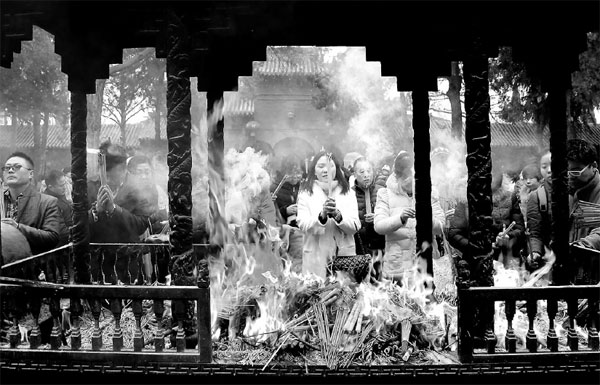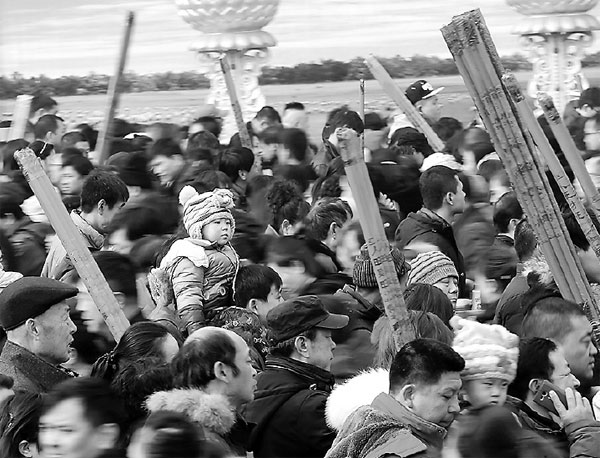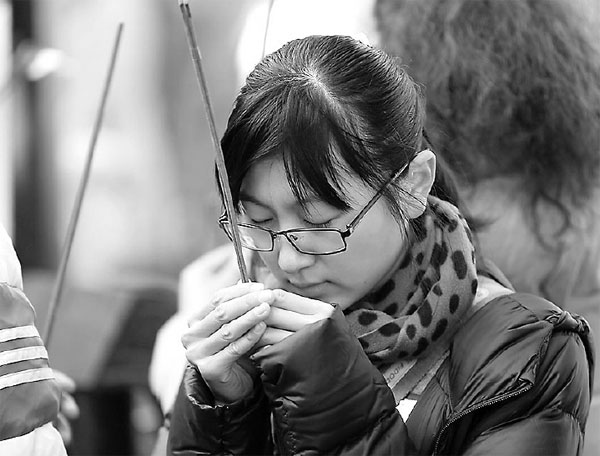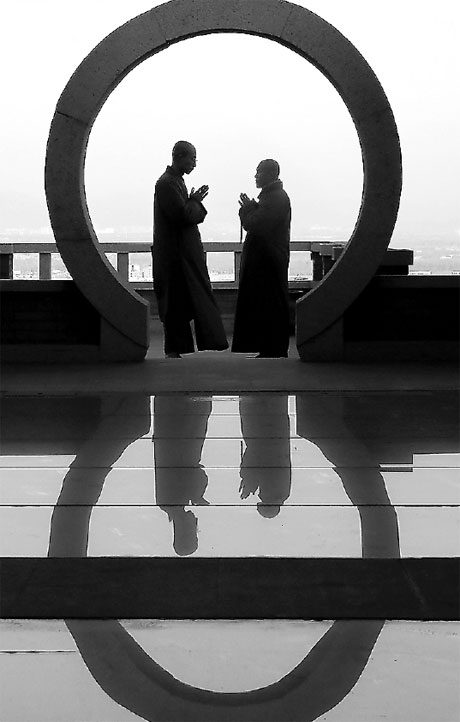In age-old Buddhist scripture, help for modern woes
Updated: 2015-04-15 07:18
By Xu Wei(China Daily)
|
||||||||
Religion enjoys surge in followers, especially among elite and white-collar workers, as life pressures increase. Xu Wei reports.
Yu Yueming had the world at her feet when she graduated from the elite China Central Academy of Fine Arts in 2012, and most of her friends and family expected her to set out on a glittering career in art.
Instead she looked inward and chose a different path, becoming a full-time volunteer at the Buddhist Longquan Monastery in the northern outskirts of Beijing.
|
People pray at the White Horse Temple in Luoyang, Henan province, on Feb 24, the last day of this year's Spring Festival holiday. Xu Hongxing / For China Daily |
|
Crowds swarm to the Lingguang Temple in Beijing on Feb 19, the first day of the lunar new year. Jiang Dong / China Daily |
|
A woman prays for blessing at the Tianning Temple in Nantong, Jiangsu province, on Feb 19. Xu Peiqin / For China Daily |
|
Two monks greet each other at the Buddhist Longquan Monastery in northern Beijing. The temple with a history of more than 1,000 years has nearly 200 volunteers, most of whom are graduates of China's elite universities. Jiang Dong / China Daily |
"I was puzzled. I didn't know what kind of life I wanted to live. At least here I have found a direction in life," said the 26-year-old, who works in the temple's animation studio.
The temple has close to 200 volunteers. Like Yu, many of them are graduates from China's top universities. Life here stands in stark contrast to the typical college experience: Out went nightclubs, karaoke bars and movies; in came early-morning starts, a vegetarian diet and regular meditation sessions.
"My life was aimless until I came here," Yu said. "And it's not only me. I'd say most of my fellow students did not know what they were living for."
For centuries, Buddhism has been an influential religion in China, and in recent years it has seen a surge in followers, particularly among the upper echelons of society. Experts say the trend is a result of efforts by religious leaders to better communicate with the public, as well as associate it with a renaissance in traditional Chinese culture and the promotion of that culture overseas.
"As people become more wealthy, the quality of life is not determined by your position or how much money you make, but by your inner strength," Yu said. "The experience of religion is a source of inner power to many people."
Venerable Master Xuecheng, vice-president of the Buddhist Association of China and abbot of Longquan Monastery, wrote in an article in February that Buddhist thinking can provide a pillar for China's socialist core value system, while playing an instrumental role to further international exchanges as China promotes the "Belt and Road" initiative.
President Xi Jinping also praised the contribution of Buddhism to traditional culture in a speech delivered at the UNESCO headquarters in March last year.
Zhuo Xinping, director of the Chinese Academy of Social Sciences' Institute of World Religions, said: "The vacuum of faith amid the rapid economic boom is clearly felt in the large number of corruption cases, the money worship and the indifference toward public affairs."
Life in crisis
Despite a rise in the number of Protestants and Catholics, Buddhism remains the most popular religion in China. More than 6.7 percent of the population claim to be followers, according to a 2012 survey by Peking University. A report by the Pew Research Center in December of the same year estimated it was more than 18 percent, giving China the world's largest Buddhist population.
Wang Zuo'an, director of the State Administration for Religious Affairs, has attributed the swell in followers to the transformation of society and the divide in social classes. "People's living standards are rising, but competition is getting fiercer and uncertainties are increasing," the Study Times recently quoted him as saying.
Wen Jinhua, a 47-year-old full-time volunteer at Longquan Monastery, said overwhelming workplace stress resulted in her looking to Buddhism as a spiritual anchor. She was previously a white-collar worker with a foreign enterprise in Beijing.
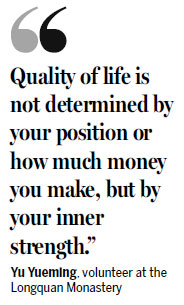
"I wanted to be the best worker in the office. But I couldn't," she said. "The mental pressure that created backfired and I was left in state of constant fear and distress."
After failing to solve her problems through psychological counseling, in 2007 Wen quit her job and joined a foundation run by the monastery. "Previously I'd spent my life focusing only on my own feelings," she said. "Then I discovered that happiness can only be achieved through reaching out to others."
Today she helps manage Master Xuecheng's blog and his Web chats with other masters and Internet users. Through proofreading the questions and answers, she said she has found many other people who are going through similar situations to the one she found herself in several years ago.
"People have all sorts of worries and distress they simply cannot solve by themselves," she said. "My work is like looking at a microcosm of society."
Lu Yunfeng, a researcher in religious studies at Peking University's Department of Sociology, said Buddhism is quickly gaining momentum in urban areas. In places without easy access to temples, he said, lay Buddhists are congregating at homes or office buildings.
He said traditional Buddhists usually meet bi-monthly, but now they congregate weekly and hold "classics classes", a kind of Buddhist Sunday school, to teach and take care of their children during worship.
"More and more intellectual elites are devoting themselves to Buddhism, which will have a profound influence to the development of the religion," he added.
Social morals
In a sign of religious leaders' efforts to better connect with the public, many Buddhist masters and experts argue that promoting the religion can help fill a void that has allowed moral decline and corruption to flourish.
In his Wisdom Education series of books published last year, Venerable Master Jingkong extols that the essence of Buddhism is education, rather than religion.
The Buddhist notion of karma can inspire people to take responsibility for their actions, and teaching that enlightenment and rebirth is within reach for believers through self-cultivation can provide a cure for the moral numbness, he wrote.
Fang Litian, a professor of Buddhist philosophy at Renmin University of China, agreed that Buddhist teachings can help to establish moral ethics in contemporary China.
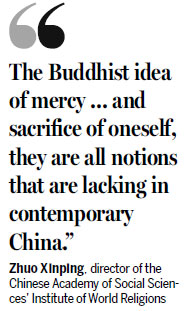
"The notion of karma can be borrowed for the building of a social moral system ... as people choose their actions based on what kind of outcome the action will lead to," he said in a commentary piece that appeared in China Ethnic News in May.
Meanwhile, the successful localization of Buddhism in China has also enabled the religion to integrate with traditional Chinese culture, which means the religion can benefit from efforts by authorities to promote that culture.
Buddhism entered China through missionaries from India during the Han Dynasty (206 BC-AD 220), and over time it incorporated the thinking of Confucianism.
Zhuo at the CASS said Buddhism offers a case study in successfully adapting to the values of a secular society. "The belief in socialism and communism is at a political level, while the belief in religion is another level," he said. "The two levels, I believe, are not conflicting."
"The Buddhist idea of mercy and compassion, the salvation of the public and sacrifice of oneself, they are all notions that are lacking in contemporary China," he added.
New media
Master Xuecheng starts a typical day at Longquan Monastery by responding to questions left by followers on his blog, which he set up in 2006. The queries range in topic from parenting and family issues to workplace conflicts and stress. The temple also posts daily updates about events online in nine languages.
"We need to make sure Buddhism is reaching the public," said Master Xianlyu at the temple. "Sharing Buddhist teachings online is the easiest way, as people today have a quicker pace of life."
He said the interactive nature of new media, which allows users the chance to have direct dialogue with masters, has proved attractive to the public. "We need to explain the thinking of Buddhist classics to modern society so they derive power from these classics," he added.
However, the promotion of Buddhist teachings now relies heavily on lay Buddhists, he said, as the reach of monks is far from adequate. Volunteers at Longquan Monastery, for example, help spread scripture through animation and short films.
Theologians say one of the big questions faced by Buddhism is how to make sure the traditional teaching responds to the changing needs of modern society.
"We're trying to pass on traditional Buddhism through new media and modern technology, but the scriptures do not change," Master Xianlyu said. "The challenge lies in how to make them palpable and acceptable."
For art graduate Yu, Buddhism has answered the questions she had after leaving college. "Some people see religion as a constraint, while it has provided me with inner strength and removed the doubt in my mind," she said. "It freed my inner self.
"Praying to Buddha may seem a tedious ritual, but in a sense it is a constant reminder that we need to control the arrogance in ourselves and be better people."
Contact the writer at xuwei@chinadaily.com.cn
(China Daily 04/15/2015 page5)
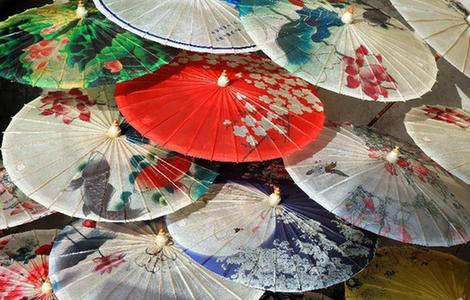
 Oil paper umbrellas made in Sichuan
Oil paper umbrellas made in Sichuan
 Ex-student sought in shooting death of North Carolina college
Ex-student sought in shooting death of North Carolina college
 Women in politics - Hillary Clinton is just one of them
Women in politics - Hillary Clinton is just one of them
 10 Red Dot Award winning carmakers in '14
10 Red Dot Award winning carmakers in '14
 Get a birthday cake for your pets
Get a birthday cake for your pets
 7 ways to beat 'spring sleepiness'
7 ways to beat 'spring sleepiness'
 Legendary painting of Mona Lisa recreated
Legendary painting of Mona Lisa recreated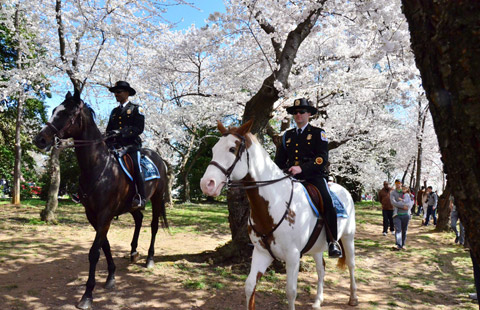
 National festival underway with cherry blossoms in peak bloom
National festival underway with cherry blossoms in peak bloom
Most Viewed
Editor's Picks

|

|

|

|

|

|
Today's Top News
US to help smart cities
Clinton's win not guaranteed despite global celebrity
US has record number of applications for H-1B tech visas
Chinese economy to slow more: World Bank report
China's slow down has upside
US voluntary medical team funded for China trip
Hilary Clinton launches
presidential campaign
'No room' for election China-bashing: US politicians
US Weekly

|

|
